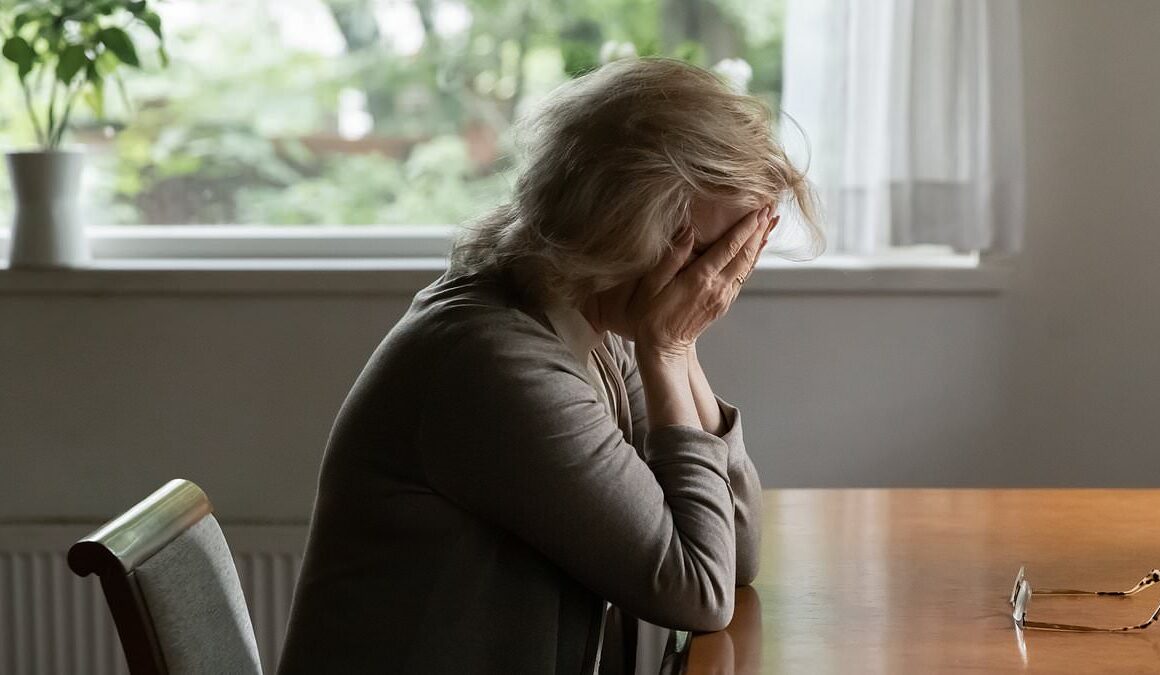Scotland is in the grip of an epidemic of loneliness as soaring numbers of people admit they live by themselves.
Nearly 100,000 more people are now living in single-person households compared to a decade ago.
The 13 per cent rise was more than double the jump seen in England and Wales.
Campaigners last night warned the startling figures amounted to a ‘public health crisis’ as growing numbers of people fall prey to loneliness.

Increasing numbers of people in Scotland, especially the elderly, are living alone
The Scottish surge, revealed in the latest findings of the 2022 Census, was driven by the country’s growing older population.
Age Scotland chief executive Katherine Crawford said: ‘Loneliness can have a huge impact on someone’s health, increasing the risk of heart disease, stroke and dementia, as well as contributing to significant mental health challenges.’
Almost a third of Scots aged over 55 – around 550,000 people – now live alone, with the highest levels of lone living found in the Western Isles, Argyll & Bute and Inverclyde.
Age Scotland urged SNP ministers to make the crisis a ‘national priority’.
The Scottish Health Survey recently found increasing numbers of Scots reported feeling lonely ‘most’ or ‘all’ of the time in 2022, up from 8 to 11 per in just a year.
But Ms Crawford said the figures were far higher among the elderly, half of whom felt lonely all or most of the time.
For a quarter of a million over-65s, the main source of company is their TV or radio.
She said: ‘With a rapidly ageing population and 1 in 3 over 55s now living alone, it’s vital that older people are supported in their communities and know where to access help.
‘People are more likely to live alone in later life for a variety of reasons such as bereavement or children and family members moving away.
‘It’s vital that we all play a part in tackling this public health crisis. That’s why we’re urging the Scottish Government to treat tackling loneliness as a national priority and ramp up activity.’

Campaigners say elderly people are especially at risk of loneliness
She stressed there was ‘a huge amount’ of community support if people reached out.
The Census found all Scottish households grew by 136,500 to 2.5million between 2011 and 2022, with 106,700 of the increase down to people living alone.
Most of the rise in lone living was in older age groups, with 40,600 more single-person households in the 55 to 64 group, and smaller rises in the 65 to 74 and over-75 groups.
Older people were twice as likely to live alone than the young, with around 30 per cent of over-55s in single-person households, against 14 per cent for people aged 16 to 54.
The increase in older people living alone was driven by more Scots living longer in general.
The rise in one-person households was 13 per cent in Scotland, compared to a 5.9 per cent in England and Wales and 19 per cent in Northern Ireland.
The National Records of Scotland published the data as part of its ‘household demographics and migration’ findings from the Census.
Scottish Conservative MSP Miles Briggs said: ‘While many people are happy living alone, there is a danger of social isolation and loneliness increasing as the number of single-person households grows.
‘Recent studies show a rise in loneliness, leading to depression, among Scots at the same time as the SNP Government are under-funding mental health provision.’
Scottish Labour deputy leader Dame Jackie Baillie said: ‘With so many Scots – particularly those over 55 – now living alone, the government must be alert to the challenges that exist.
‘We know that older people living alone are more likely to suffer from loneliness or mental health issues. That’s why it is vital that the Scottish Government is prepared to act to support older people who live alone to ensure they get any help they may need.’
Scottish Liberal Democrat leader Alex Cole-Hamilton added: ‘Prolonged loneliness can negatively impact anyone’s mental health and with more people living on their own, there is a very real risk that this takes a severe toll.
‘We want to see investment in activities for those who are particularly vulnerable to isolation, like older people and disabled people.’
The Census also found ever more cohabitation instead of marriage or civil partnerships.
All couple households rose 4.5 per cent to 1.25million, but cohabiting households were up 25 per cent since 2011 and 81 per cent since 2001.
Continuing a 50-year trend, the proportion of homes with married or civil partnership couples fell from 86 per cent in 2001 to 77 per cent in 2022.
Around 555,000 of the 5.5million people living in Scotland were born outside the UK, with Poland (75,400), India (37,700) and Pakistan (28,900) the most common countries of birth.
Jon Wroth-Smith, Director of Census Statistics for NRS, said: ‘This information allows governments, businesses and charities to plan services for the years ahead.’
SNP Equalities Minister Kaukab Stewart said: ‘The Scottish Government recognises that Social Isolation and Loneliness is a vital public health issue.
‘That is why we launched our social isolation and loneliness fund, providing £3.8 million over the next three years to organisations that help people to connect with one another in our communities.
‘We will continue to work with our partners to deliver the actions set out in our strategy for tackling loneliness, A Connected Scotland.’
■ The Age Scotland Friendship Line makes weekly calls to older people in need of a friendly ear to listen. Contact 0800 12 44 222.








